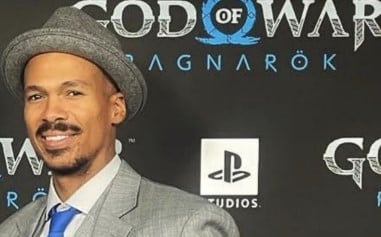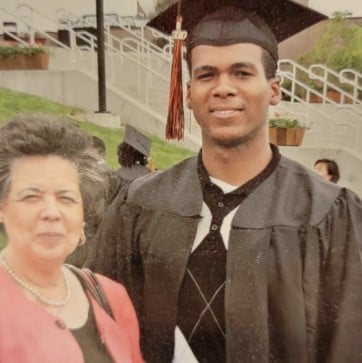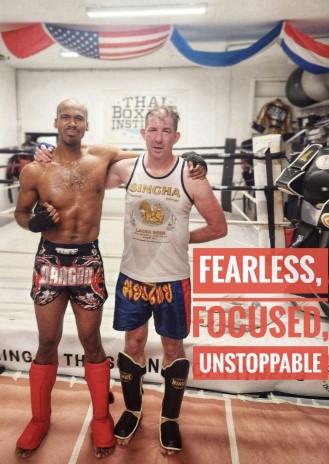 “Don’t get frustrated with yourself. There are things that you’re going to struggle with. Lean into the things that you do well, those strengths…and don’t dwell on how people treat you. You’re smart and probably smarter than a lot of other people. The world isn’t set up for us, so we have to navigate it slightly differently, and it gives us an advantage.” — Stephen Oyarijvbie
“Don’t get frustrated with yourself. There are things that you’re going to struggle with. Lean into the things that you do well, those strengths…and don’t dwell on how people treat you. You’re smart and probably smarter than a lot of other people. The world isn’t set up for us, so we have to navigate it slightly differently, and it gives us an advantage.” — Stephen Oyarijvbie
When Stephen was 4 years old, he fell in love with video games and wanted to create them. Flash forward to today and Stephen’s living his dream as a combat designer for Sony Santa Monica.
But things weren’t always easy in-between.
Take a listen to my full interview with Stephen. It was a wide-ranging conversation that talked about challenges early in life as well as positive influences, finding success in higher education, the post grad years, and ultimate his work life.
In the early years of schooling (3rd to 5th grade) he described the disruption and confusion of “finding things out,” that many may relate to. When difficulties arose various people would wonder “Why is he not getting this?” and “Is he acting out?”. He was at risk of being held back and ended up going to summer school, but it was there that staff discovered, that he understood the classroom and if given a chance to articulate his knowledge, he was quite smart.
Looking back, Stephen recalled not completely understanding his challenges in school. He wasn’t given practical strategies or told how to cope with learning differently. He remember becoming sensitive to criticism and also being aware that because he was sensitive to how his classmates felt (from Fernette: emotional intelligence, empathy), his situation caused stress and made him sad. Still, he had friends who supported him, like a friend who took notes for him and his mother (whom he said may never have played a video game before), knew to give him the space to be excited about games and then choose it for a career.
STORYTELLING STRENGTHS
I asked Stephen about about strengths he might have had in these early years, and besides his early enthusiasm for playing video games, he remembers analyzing games all the time, whether it was playground games or games he played with his action figures.
Stephen: “I think a lot of kids do this, but I had a really big war between stuffed animals and Legos once upon a time and there was a floating base and whole saga…”
As I mentioned in my interview with Stephen, not everyone has those highly imaginative storytelling strengths. It’s a talent that involves simulation and scene construction in the brain – strengths that can be used all sorts of ways in creative work.
OTHER EARLY TALENTS
Stephen also recalled excelling in math. When he looked at certain problems, he could see simple solutions – and some of his classmates didn’t have this ability. But although answers often came quickly, he was not as quick if he had to write every thing down and show how he arrived at his answers.
Stephen also recalled how he loved how a teacher’s aide read Harry Potter to him and that inspired him to want to learn more things. It was also around this time that he recognized that he could vividly remember what he heard, whether it was the story being read aloud or conversations he had with people – their context, including, or instance what they were wearing, which is classic episodic or personal memory.
 HIGH SCHOOL TO COLLEGE
HIGH SCHOOL TO COLLEGE
Academically, things started getting better for Stephen in high school. His school had the Wilson program and his reading and general communication began to improve. But he also recalled some of the stigma – being someone who might have “issues” learning, being labeled with a learning disability or being slightly different – but he also realized there were times where he felt more advanced than other students, but he couldn’t prove it.
In high school, Stephen still kept his singular focus on game design and programming. He was pretty good at track and had some opportunities to play basketball and volleyball, but he chose to focus on cognitive pursuits.
It was only in his senior year that he could take programming courses because of extra language classes he was assigned. At first, Stephen had some difficulty with coding commands that didn’t have much tolerance for misspellings. A friend introduced him Open Dyslexia font and that helped. Languages with predictive text and visual scripting are easier.
KINESTHETIC AND EPISODIC MEMORY SUPER POWERS
Stephen: “I don’t get lost. I always know how to find my car, because I know how the streets connect. When I design a video game, I can remember the spaces and the creatures…and the 3-dimensional connectivity of like, where I am relative to my car. If I cut across the street, like, I don’t have to follow the path because I know how it connects it even if I had never seen it before.”
Stephen also said this type of movement and travel memory helps him in Muay Thai (kickboxing). Muay Thai is a very physically demanding sport and it requires strong kinesthetic abilities and perceptiveness with an opponent. Because actions occur so quickly, having strong kinesthetic senses and perceptiveness to the moves or potential moves of your opponent, can help tremendously.
 Outside of the sport, it was interesting to hear that Stephen was aware of how he also recognizes people on the basis of their movements – like the cadence of their footsteps or the differences between identical twins.
Outside of the sport, it was interesting to hear that Stephen was aware of how he also recognizes people on the basis of their movements – like the cadence of their footsteps or the differences between identical twins.
Brock and I have heard about this kinesthetic perceptiveness in a variety of situations – for instance, when a dyslexic entrepreneur told professor Julie Logan that he would listen for footfall patterns of customers entering his and other stores to get a measure of their excitement and another dyslexic entrepreneur’s program with the Department of Defense to use computer sensors that recognize different movements that may warn of an impending terror attack at military roadblocks. One of our past Board members, Erin Egan, also told us that she would be especially good at reading nonverbal signs of potential international business partners – and this would help her team and bosses anticipate difficulties and roadblocks to successful negotiations.
This strength can be part of a larger talents in emotional intelligence and has applications in virtually all careers and day-to-day relationships.
Stephen also talked about his path from Rochester Institute of Technology, to an indie game company in Texas, then Microsoft Game Studios and other game studios in the Seattle area, to Sony Santa Monica today.
If you’re interested in working in the video game industry, listen or watch the whole interview.
His path may be more common than not for recent college graduates. He had made some games and friends in school, but wasn’t recruited out of college from big game companies. It was easiest for him to work in his college area in the first few years, then learn by doing – help create indie games and get hired as a contractor rather than enter a company through a generic entry post listing.
Stephen also showed vision in trying to learn all he could about his dream company – through company wikis and industry events, so that finally when the call came, it was if he was already there.
Congrats to Stephen for living out his dream job in such a competitive field!
“The thing that makes you feel most alone is the thing that makes you exceptional…” — Stephen Oyarijivbie














